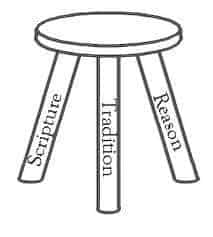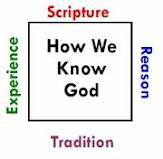 In chapter 11 of his book Sacred Word, Broken Word: Biblical Authority and the Dark Side of Scripture
In chapter 11 of his book Sacred Word, Broken Word: Biblical Authority and the Dark Side of Scripture, Kent Sparks tackles the question of whether our Christian theology should be limited to the Bible. In the opening paragraph (p. 118) Sparks says “no,” that we must “move beyond Scripture’s discourse” and attend to other “voices”–four in all:
Spirit, Cosmos, Tradition, Experience
I realize some will quickly chime in, “No, no. Only the Bible! There is no other foundation upon which to base Christian theology.”
Sparks points out, however, is that these other voices, ironically, have biblical precedent–at least the first three on the list do. I would also add that I’ve never know anyone to “stick to the Bible” in some pure sense. We all move Beyond the Bible more quickly that even “purists” realize.
The Voice of the Spirit–The Spirit of God is active in the life of the church and the world today, has always been, and his voice cannot be reduced to “the Bible.” Sparks refers to Acts 15, where the apostles made a decision that “seemed good to the Holy Spirit and to us” (Acts 15:28) that the gentiles be included without placing on them the burden of getting circumcised and obeying the Law of Moses (v. 5, which is what the Bible required of gentiles). This decision was made in dialogue with Scripture (vv. 16-18 citing creatively Amos 9:11-12) but not with Scripture as giving a clear command.
The Spirit was needed for that and the Spirit “pushed” the early church to move in a certain direction beyond what the Bible says and what the current cultural situation dictated. The Spirit is not bound by the Bible, in part because if that were the case, the Spirit could be controlled by exegesis, which is the temptation for all Christian demagogues.
The Voice of the Cosmos–According to Psalm 19:1-4, “the heavens declare the glory of God….” The implication for Sparks is that every area of human inquiry “may provide vital resources for theological reflection” (v. 122). He then applies this to the on-going debate among some Christians over evolution. Pitting science “against” Scripture misunderstands a vital truth: Scripture is not prepared to provide every type of knowledge all by itself.
The Voice of Tradition–The New Testament itself speaks of tradition that is passed down and taught to later generations (2 Thessalonians 2:15; 1 Corinthians 11:2). Our own understanding of “tradition” today, Sparks argues, should be a broad, catholic, understanding, where “tradition” is not one small authoritarian voice of a particular denomination or sliver of theological tradition, but “a family of closely related traditions that have different but overlapping judgments about Scripture, theology, and Christian practice” (p. 127).
The Voice of Experience–Sparks is using the word “experience” in the broadest sense to include religious experience (sometimes associated with mysticism) and experience of everyday life, whether of the world around us or perceiving our own thoughts and ideas. “Experience” understood this way clearly brings into the picture the active work of the Spirit in our lives, mentioned above. Experience is a way of talking about who we are and where we’ve been, the sum total of our conscious being. Our theological reflections are never divorced from who we are.
Some of you will no doubt recognize in Sparks’s list some overlap with the Wesleyan Quadrilateral (Scripture, tradition, reason, experience) and the Episcopalian three-legged stool (Scripture, reason, tradition). We see in the larger Christian tradition models waiting for us that understand the inevitability and wisdom of “going beyond the Bible” in our quest to live lives of Christian wholeness.
Wesleyan Quadrilateral (Scripture, tradition, reason, experience) and the Episcopalian three-legged stool (Scripture, reason, tradition). We see in the larger Christian tradition models waiting for us that understand the inevitability and wisdom of “going beyond the Bible” in our quest to live lives of Christian wholeness.
 [This post is part of an on-going series discussing Scared Word Broken Word.
[This post is part of an on-going series discussing Scared Word Broken Word.
The first post in the series can be found here.]
